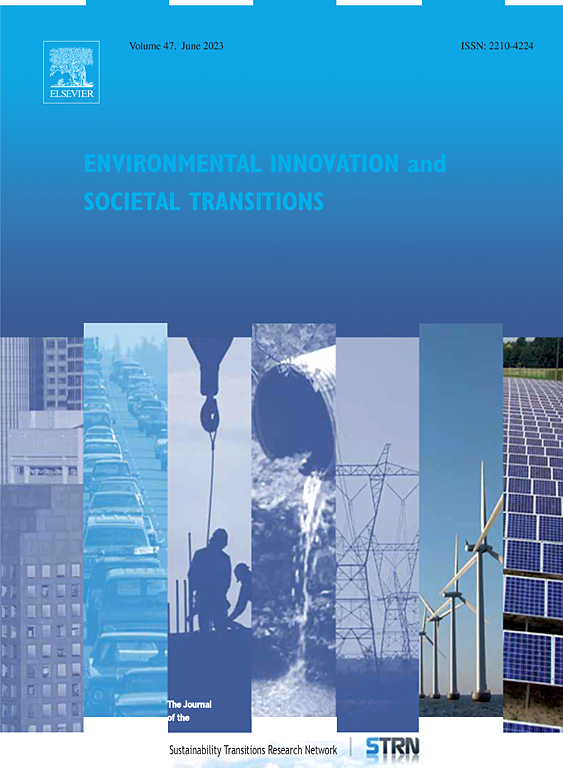Building local sustainability: Identifying critical transformative capacities
IF 6.1
2区 经济学
Q1 ENVIRONMENTAL SCIENCES
Environmental Innovation and Societal Transitions
Pub Date : 2025-09-03
DOI:10.1016/j.eist.2025.101043
引用次数: 0
Abstract
This article advances the conceptual understanding of transformative capacity among local sustainability actors. It constructs and empirically explores a conceptual framework that allows for a more nuanced, contextual understanding of how public, private and civic actors at the urban scale co-creatively build capacity for sustainability transformation. We start by combining emergent sections of sustainability transitions and collaborative governance literatures into a theoretical framework a) defining unique political-institutional transformation contexts and b) characterizing their situated capacity potential. The theoretical framework is further explored through comparison of 12 local government-led, market-led and civil society-led transformative initiatives at the local scale. This theoretical-empirical exploration enables us to tease out two sets of critical capacities. First, four contextual capacities; ideational, institutional, adaptive and experimental capacity. Second, two foundational capacities; holistic leadership and co-creation. They are summarized in a ‘Butterfly model of transformative capacity for sustainability’ offering a platform upon which to build new and more nuanced understanding of needed transformative capacities. In conclusion, we argue that the increasingly turbulent local, national and international context calls for even stronger leadership and co-creation capacities to dynamically adapt, innovate and transform to uphold and further develop key sustainability goals and purposes.
建立地方可持续性:确定关键的变革能力
本文提出了对地方可持续发展行动者的变革能力的概念理解。它构建并实证地探索了一个概念框架,该框架允许对城市规模的公共、私人和公民行为体如何共同创造性地建设可持续性转型的能力有更细致入微的背景理解。我们首先将可持续性转型的新兴部分和协作治理文献结合到一个理论框架中:a)定义独特的政治-制度转型背景;b)描述其所处的能力潜力。通过对12个地方政府主导、市场主导和公民社会主导的地方尺度变革举措的比较,进一步探讨了理论框架。这种理论-实证探索使我们能够梳理出两套关键能力。第一,四种语境能力;理念、体制、适应和实验能力。二是两大基础能力;全面领导和共同创造。它们被总结为“可持续转型能力的蝴蝶模型”,提供了一个平台,在这个平台上,人们可以对所需的转型能力建立新的、更细致的理解。总之,我们认为,日益动荡的地方、国家和国际环境需要更强大的领导和共同创造能力,以动态适应、创新和转型,以维护和进一步发展关键的可持续发展目标和宗旨。
本文章由计算机程序翻译,如有差异,请以英文原文为准。
求助全文
约1分钟内获得全文
求助全文
来源期刊

Environmental Innovation and Societal Transitions
Energy-Renewable Energy, Sustainability and the Environment
CiteScore
13.60
自引率
19.40%
发文量
90
审稿时长
56 days
期刊介绍:
Environmental Innovation and Societal Transitions serves as a platform for reporting studies on innovations and socio-economic transitions aimed at fostering an environmentally sustainable economy, thereby addressing structural resource scarcity and environmental challenges, particularly those associated with fossil energy use and climate change. The journal focuses on various forms of innovation, including technological, organizational, economic, institutional, and political, as well as economy-wide and sectoral changes in areas such as energy, transport, agriculture, and water management. It endeavors to tackle complex questions concerning social, economic, behavioral-psychological, and political barriers and opportunities, along with their intricate interactions. With a multidisciplinary approach and methodological openness, the journal welcomes contributions from a wide array of disciplines within the social, environmental, and innovation sciences.
 求助内容:
求助内容: 应助结果提醒方式:
应助结果提醒方式:


